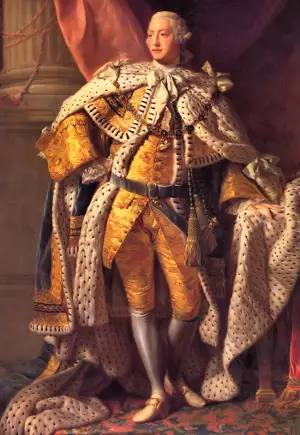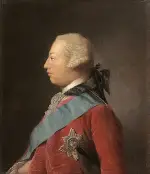King George III of England
Part 2: Wars and Legacy The king logically concluded that the North American colonists should help pay the debt incurred by the British Government during the North American war, and Prime Minister Lord North agreed, pursuing a policy of taxation on various items and practices for more than a decade or so after the war ended. The first of these was the Stamp Act, what amounted to a tax on paper used for official documents; that tax caused such a backlash in the North American colonies that Congress repealed the tax law several months after its introduction. Still faced with debt, Britain introduced more and more taxes on more and more things that American colonists used regularly, like sugar and glass and paint and tea. The most famous act of civil disobedience to this series of taxes was the Boston Tea Party, in which American colonists dumped huge chests full of tea into Boston harbor as a protest against the Tea Act. Several taxes, restrictive measures (Townshend Acts and Intolerable Acts, and protests later, the British Army was at war with a hastily put together Continental Army, led by a veteran of the French and Indian War named George Washington. 
A large of American colonists called a colonies-wide meeting, the Continental Congress to discuss how to pursue meaningful change within an increasingly hostile environment. The Congress met on and off for several years; out of the midst of one of those meetings came the Declaration of Independence, in which the colonists stated their intent to throw off the yoke of what they saw as British oppression. The document, largely written by Thomas Jefferson, borrowed heavily from the utilitarian ideals of John Locke, Jean Jacques Rousseau, and others; to emphasize that the Congress's objections were with King George III first and foremost, the document authors ascribed all of their complaints to things that the king had or hadn't done that created what the colonists saw as an untenable situation. In a series of events that must have seemed incredible, if not impossible, to King George III and a succession of ministers, the Revolutionary War ended in the surrender of the forces of Lord Charles Cornwallis at Yorktown in 1781 and the Treaty of Paris in 1783, which gave the newly created nation the United States official recognition by Great Britain, its onetime Mother Country and military adversary. The king considered abdicating after the war but stayed on the throne. It was in 1788 that he suffered the first of a series of attacks that was then and for many years afterward declared to be insanity. (One theory popular with modern historians is that the king was suffering from the inherited disease porphyria, a disease of the kidneys). Great Britain didn't have to wait long for another war, as a fresh conflict with France arrived, after the French Revolution of 1789. France was at war with most of the rest of the Europe, and French leader Napoleon Bonaparte desperately wanted to pursue an invasion of England (and the king himself had at one point offered to take to the field of battle; his advisors had convinced him to leave the fighting to his generals); however, the British fleet, under the leadership of Admiral Horatio Nelson, defeated the French at the Battle of Trafalgar, in 1805, and French dreams of a seaborne invasion of England were gone. Britain pressed the advantage, fighting in Spain to expel a French takeover there and joining with other European powers to defeat France once and for all–not once but twice–with Britain's Duke of Wellington leading the way to a final victory in the 1815 Battle of Waterloo. George III was still king at this time, but he had made the Prince of Wales–his oldest son George–a regent in 1811. George III died on Jan. 29, 1820. He had reigned 60 years, the third-longest reign in British/English history. His regent son became King George IV. 
The idea that George III "lost the North American colonies" has punctuated assessment of his reign through the years, as have discussions of his sanity, or possible lack thereof. He was definitely physically ill for much of the last decade or two of his life. He struggled at times to understand the vehemence with which many American colonists regarded him, especially since the same people who erected a statue of him in New York City after the repeal of the Stamp Act later pulled down that statue in the wake of a subsequent tax protest. Nonetheless, when John Adams arrived as American Minister to London in 1785, the king was to happy to meet with him as the representative of a new and independent nation. George III remained popular in Great Britain despite "losing North America," and it was only after his physical problems manifested themselves publicly enough that he was forced to accept the regency of his oldest son that the king's popularity waned. Other elements of the life of King George III:
|
|
Social Studies for Kids
copyright 2002–2024
David White




